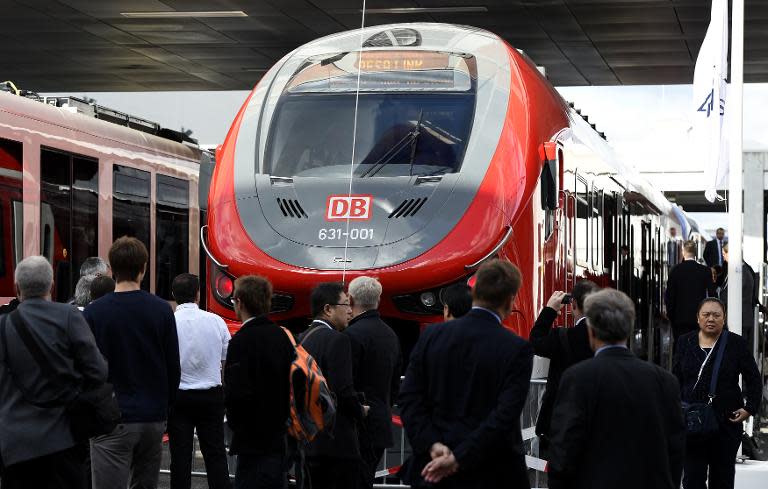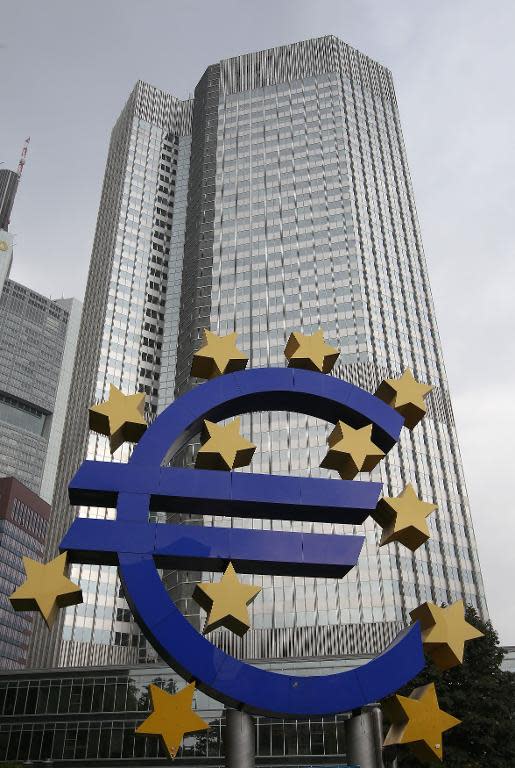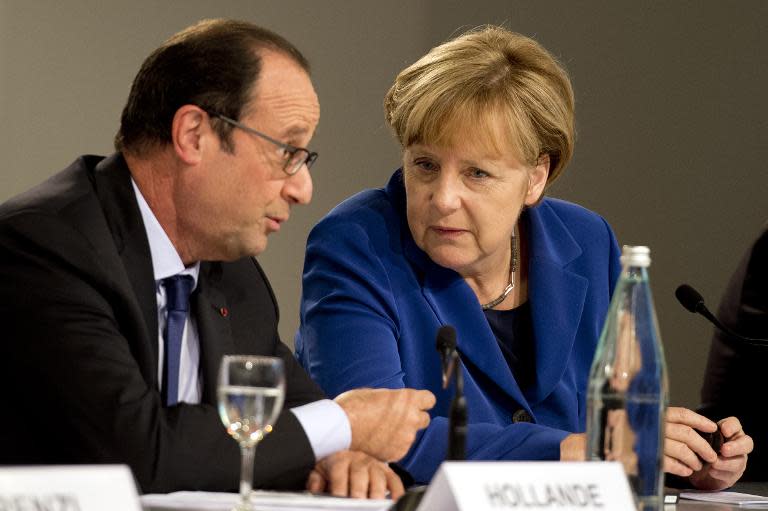Gloom over eurozone as German growth outlook darkens
The outlook for the eurozone darkened Thursday as top think tanks slashed their forecasts for German growth -- traditionally the bloc's economic engine -- both this year and next. And the institutes urged the German government to abandon its austerity mantra and boost public spending to kick-start growth, just as a number of countries led by France have long argued, and as a new showdown on economic policy in the eurozone looms. The four institutes -- Ifo in Munich, DIW in Berlin, RWI in Essen and IHW in Halle -- predicted in their widely-watched half-yearly report that the German economy would grow by just 1.3 percent in 2014 and 1.2 percent in 2015. That is much lower than the 1.9 percent and 2.0 percent they had previously expected. And they argued instead of always trying to balance its books, Berlin should ramp up investment in the public sector as a way of reigniting the flagging economy. "Economic growth in Germany has cooled noticeably," said the institutes, whose reports are used by the government as a basis for its own economic forecasts. Chancellor Angela Merkel said Berlin had "taken note" of the downgraded forecasts. "They don't come as a surprise, because overall economic forecasts have clouded over somewhat," she said. Earlier this week, both the International Monetary Fund (IMF) and the Organisation for Economic Co-operation and Development (OECD) warned about a loss of momentum in the eurozone recovery as the German economic engine stalled. - No change this year - "After gross domestic product contracted in the second quarter and likely stagnated in the third quarter, the economic engine is finding it difficult to get going," the report said. "The German economy is stagnating. And there's no indication for the moment that that will change before the end of the year," DIW economist Ferdinand Fichtner told a news conference. Earlier Thursday, trade data for both France and Germany further darkened sentiment for the eurozone as a whole, as exports from its two biggest economies dropped sharply. A policy of easy money, as currently practised by the European Central Bank, was not the cure-all for Europe's problems, the institutes argued. "Monetary policy is trying its best to stimulate the eurozone economy and interest rates are very low in Germany as a result. "However, the latest raft of measures are unlikely to provide any additional impulses for the economy," the institutes warned, referring to the ECB's contested plans to buy bonds and other assets in order to inject cash into the economy. The onus was therefore on governments. And Berlin should increase spending in the public sector, the experts said. - Room for manoeuvre - "The government isn't making sufficient use of the margin for financial manoeuvre with regard to investment, such as in infrastructure," said DIW's Fichtner. "On the spending side, public spending should be increased in those areas which can potentially boost growth," the institutes said. Fichtner suggested that balancing a country's books "isn't necessarily an end in itself from an economic point of view." In fact, it could cost more in the long run, in terms of low growth, than the immediate costs of a small deficit, he argued. The institutes' call for increased public spending will please Germany's eurozone partners, such as France, which are arguing for a relaxation of the single currency bloc's budget rules, despite fierce resistance from Berlin. At an informal meeting of EU leaders in Milan earlier this week, French President Francois Hollande threw down the gauntlet to Merkel by saying that instead of further austerity measures to trim France's budget deficit, the rules should be eased to reverse flagging growth across the eurozone. At the four institutes' new conference, Roland Doehrn of RWI, acknowledged that the budget question was a "source of tension." But Oliver Holtemoeller of IWH insisted: "It's not a measure of spending as much as possible," but kick-starting the moribund economy. Berenberg Bank economist Christian Schulz said he expected the German economy to expand by a meagre 0.1 percent in both the third and fourth quarters "and we cannot even rule out a mild technical recession."





